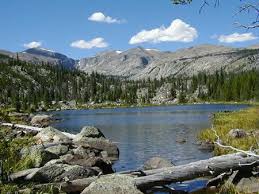There is nothing unusual in this story except that watching her brought back a powerful memory of a time when, as I confirmed with my parents later, I was exactly the same age as Sarah and my family was driving cross-country. We stopped at a ranch of friends of theirs in Buffalo, Wyoming. Sherwood Smedley, I am told, was an iconoclastic Chemistry teacher who decided to wear bolo ties when faculty were suddenly required to sport neckwear, slept on the porch of his cabin all summer and each morning would reach down through a trap door next to his bed and pull out a cool beer. But what I remember most was that he had horses, and I got to ride them. I do not actually remember much conscious detail from that time, but I do retain such a strong feeling that it has become part of my working memory.
The feeling was one of awe at the size of the horses, but also of risk and danger once I was on them. And yet, I had a degree of control at the same time. The horse responded to what I did, but also had a mind of it own. There was a feeling of self-efficacy, but also of chance and mystery. The feeling was exhilarating and unforgettable. And I have always wondered why this feeling has captured my imagination for so long and with such precision and tenor.
At the time that Sarah and her family arrived at the lake I was reading a book by a social psychologist,
Timothy Wilson, entitled
Strangers to Ourselves: Discovering the Adaptive Unconscious.
The assumption behind social psychology is that it is not the environment that influences people as much as their constructs of the world--the stories we tell themselves. B
ut Wilson goes Didion one more level and studies what he calls the "adaptive unconscious." (This idea was popularized by Malcolm Gladwell in his book Blink.) Wilson writes, "we can define the adaptive unconscious as the mental processes that are inaccessible to consciousness but that influence judgments, feelings, or behaviors. Our sense at any one time are taking in 11,000,000,000 pieces of information: this is the number of receptor cells in each sense organ and the nerves that go to the brain. Our eyes receive 10,000,000,000 signals a second. We consciously process only about 40 pieces of information per second, which suggest something is processing the rest of the data."

I think that my time riding horses on Sherwood Smedley's ranch in Wyoming in 1962 may well have been a feeling that is a powerful thread that underwrites my own story of who I am. The fact that I have done nothing since with horses, or Wyoming is irrelevant because it was the "feeling" that I remember so vividly, not the circumstances. Is it true then that Didion is right, we tell ourselves stories in order to live, but that Wilson is right too? There is another part, just as strong or stronger sometimes, that does not work in a narrative way, but works prior to us actually making choices, but is just as determining of who we think we are? Sometimes we just have feelings that aren't really fully formed stories, but the results of which are observable to ourselves and other people in our behavior.
I spent the next couple of hours kayaking with Sarah to different parts of the lake and watching her excitement as she found (and I consciously encouraged) new things to do at every stop--how to turn circles, how to surf waves, how jump on and off from different rafts we came upon. I confess it was a re-living of that time in Wyoming, but now something that I was facilitating in someone else. As I had been reading in Wilson's book, "We should let our adaptive unconscious do the job of forming reliable feelings and then trust those feelings, even if we cannot explain them entirely." Is it possible that Sarah could leave the lake that afternoon with a defining experience because she will incorporate the feeling of kayaking on Great East Lake into her own sense of her personality and her behavior and the story she tells herself about who she is?
So, after all of this, I am wondering, what are the other times in my life where I let my adaptive unconscious form reliable feelings, and then acted upon them in a way that made them part of the story of who I am? And how might I get better at recognizing those moments of Sarah kayaking, and act to help them along? Recognizing, and creating, those environments would be a level of "teaching" I could really learn from.
This is reminiscent of my time in CITYterm Fall 1999 after the Brooklyn Bridge when I said that I was overcome by a sweeping feeling of national pride, and then proceeded to hum the tune that played in my head: the British national anthem.
ReplyDeleteIt was the feeling that counted.
It's not about recounting with exactitude what actually happened, it's about getting the feeling right.
How to tell a true war story, yah?
ryan, love it....and yes, a war story indeed...and you are so right the feeling....that is what Lewis Mumford felt on the bridge...did you read that selection? it is in Empire CIty...i love it
ReplyDelete